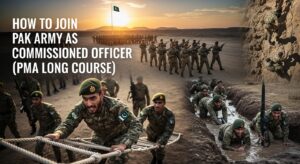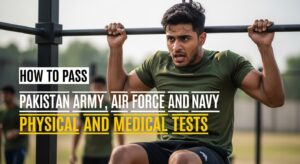Preparing for the initial tests of the Army, Navy, and Pakistan Air Force is a journey that demands a blend of smart planning, consistent effort, and a clear understanding of each stage in the process. The path begins with a deep dive into the selection procedures and test formats for each branch. Candidates must familiarize themselves with the specific requirements, including the types of questions, the structure of the computer-based exams, and the physical and medical standards.
This foundational knowledge is crucial, as it allows you to focus your preparation on the most relevant areas, avoid unnecessary distractions, and approach the process with confidence. By gathering official syllabi, reviewing past papers, and understanding the scoring criteria, you set yourself up for targeted and effective study sessions.
Once you have a clear grasp of the process, the next step is to build a realistic and sustainable study schedule. This involves assessing your current strengths and weaknesses through diagnostic tests, then breaking down the syllabus into manageable daily and weekly goals. Consistency is key, so dedicating a set number of hours each day to both academic and physical training ensures steady progress.
Incorporating regular revision, mock tests, and physical workouts not only sharpens your knowledge but also builds the stamina required for the actual test day. Quality resources play a vital role here; using recommended books, trusted online platforms, and interactive quizzes streamlines your learning and keeps you focused on what matters most. Staying updated with current affairs and practicing under timed conditions further enhances your readiness for the diverse challenges of the initial tests.
The final phase of preparation is all about execution and continuous improvement. Simulating full-length tests under real exam conditions helps you manage time, reduce anxiety, and identify areas that need further attention. Physical fitness routines should be maintained alongside academic revision, as both are equally important for success.
After the test, reflecting on your performance, seeking feedback, and preparing for subsequent stages such as interviews and medical exams ensures you remain on track for final selection. Throughout this journey, common challenges like test anxiety, low motivation, or confusion about the syllabus can arise. Addressing these proactively by setting realistic goals, practicing stress management techniques, and seeking support from mentors or study groups will keep you resilient and focused.
By following a structured, step-by-step approach, you maximize your chances of excelling in the Army, Navy, or PAF initial tests and move closer to achieving your career goals.
Step 1: Understand the Selection Process and Test Format
Before you begin preparation, invest significant time understanding the entire selection process and the format of the initial tests for your chosen service branch.
Category | Details |
Branch-Specific Test Components | Army: Verbal & non-verbal intelligence, GK, mathematics, English, sometimes Urdu & Islamic studies. Navy: Similar to Army; may include technical subjects (physics, chemistry) for technical roles. PAF: Verbal & non-verbal intelligence, mathematics, physics, English, GK; strong focus on problem-solving & critical thinking. |
Test Structure | Computer-based MCQs. Timed sections (30–45 minutes each). PAF Example:
Army & Navy follow similar patterns (check syllabus per post). |
Passing Criteria |
|
Gather Official Information |
|
Why This Step Is Critical |
|
Step 2: Create a Realistic and Detailed Study Schedule
A well-crafted study plan is the backbone of successful preparation.
Category | Details |
Assess Your Starting Point |
|
Set Clear, Measurable Goals |
|
Daily Study Routine |
|
Physical Training Integration |
|
Revision and Mock Tests |
|
Maintain Flexibility |
|
Step 3: Gather High-Quality Study Materials and Resources
Having the right materials saves time and ensures effective learning.
Category | Details |
Books |
|
Online Resources |
|
Apps and Software |
|
Current Affairs and GK |
|
Practice Papers and Quizzes |
|
Step 4: Master Cognitive and Academic Sections with Depth
Each cognitive and academic section requires focused strategies.
Category | Details |
English Language |
|
Mathematics |
|
General Knowledge |
|
Intelligence Tests | Verbal Intelligence: Analogies, synonyms/antonyms, coding-decoding, logical sequences. Non-Verbal Intelligence: Pattern recognition, series completion, spatial reasoning, figure classification.
|
Physics & Chemistry (PAF & Navy Technical Roles) |
|
Timed Practice |
|
Step 5: Develop Physical Fitness and Prepare for Physical Tests
Physical fitness is as crucial as academic preparation.
Category | Details |
Know the Test Components |
|
Design a Fitness Regimen | Cardio: Running, jogging, cycling, interval training. Strength: Bodyweight exercises – push-ups, pull-ups, planks, sit-ups, squats, lunges. Flexibility & Agility: Stretching routines & agility drills to prevent injuries. |
Progressive Overload |
|
Nutrition and Hydration |
|
Rest and Recovery |
|
Practice Test Simulations |
|
Step 6: Prepare Thoroughly for Medical Examination
Medical fitness is non-negotiable.
- Understand Medical Requirements:
- Medical exams include physical check-up, vision and hearing tests, and medical history review.
- Conditions like color blindness, chronic diseases, or physical deformities can disqualify candidates.
- Maintain Good Health Habits:
- Avoid smoking, alcohol, and harmful substances.
- Keep up with vaccinations and treat any infections or ailments promptly.
- Pre-Exam Health Check:
- Get a general medical check-up before the official exam to identify and treat any issues.
- Be Honest During Medical Interview:
- Disclose all relevant medical history to avoid future complications.
- Prepare Mentally:
- Stay calm and confident during the medical exam.
Step 7: Prepare for Psychological and Personality Assessments
Some branches include psychological evaluations.
- Self-Reflection:
- Understand your motivations, strengths, weaknesses, and leadership qualities.
- Practice Personality Tests:
- Online resources offer sample personality and psychological tests.
- Interview Preparation:
- Prepare to answer questions about your background, aspirations, and suitability for military life.
- Communication Skills:
- Work on clear, confident verbal communication.
- Stress Management:
- Practice relaxation techniques like deep breathing and visualization.
Step 8: Simulate Full-Length Tests and Review Intensively
- Full-Length Mock Tests:
- Take complete tests under timed conditions to build stamina and time management skills.
- Detailed Review:
- Analyze every mistake to understand why it happened and how to avoid it.
- Track Progress:
- Maintain a log of scores and improvements.
- Seek Feedback:
- Join study groups or get mentorship from experienced candidates.
Step 9: Final Preparations Before Test Day
- Organize Required Documents:
- Admit card, CNIC, application forms, stationery.
- Rest Well:
- Get at least 7-8 hours of sleep before the test day.
- Nutrition:
- Eat a light, nutritious breakfast to maintain energy.
- Arrive Early:
- Reach the test center with ample time to avoid last-minute stress.
- Stay Calm:
- Use relaxation techniques to manage anxiety.
- Follow Instructions Carefully:
- Read each question attentively during the test.
Step 10: Post-Test Actions and Continuous Improvement
- Analyze Performance:
- Reflect on what went well and what needs improvement.
- Prepare for Next Stages:
- Interviews, physical tests, and medical exams.
- Maintain Fitness and Study:
- Keep improving until final selection.
- Stay Motivated:
- Persistence is key.
Common Issues and How to Troubleshoot Them Effectively
| Step / Issue | Troubleshooting |
|---|---|
| Step 1: Understanding the Process – Confusion about test format and syllabus leads to scattered preparation | Use official sources and verified guides only. Join forums or coaching centers for clarity. Make a checklist of topics and test sections. |
| Step 2: Creating and Following a Study Schedule – Difficulty in sticking to the plan due to distractions or overambition | Set realistic, achievable daily goals. Use timers and apps to block distractions. Reward yourself for milestones to stay motivated. |
| Step 3: Accessing Quality Study Materials – Overwhelmed by too many resources or poor-quality materials | Choose 2–3 trusted books and websites. Avoid random YouTube videos without reviews. Use solved papers and tutorials from reputed sources. |
| Step 4: Mastering Academic and Cognitive Sections – Slow progress in difficult topics or anxiety during timed practice | Break topics into smaller parts; master basics first. Practice daily with increasing speed. Use relaxation techniques before practice to reduce anxiety. |
| Step 5: Physical Fitness Preparation – Injuries, lack of progress, or low motivation | Warm up properly before exercise. Consult a trainer for a personalized plan. Track progress visually (charts/photos). Train with a partner for motivation. |
| Step 6: Medical Examination – Unexpected disqualifications due to minor health issues | Get a pre-exam medical check-up. Address health issues early. Maintain healthy lifestyle habits consistently. |
| Step 7: Psychological and Personality Tests – Nervousness and unclear about what is assessed | Practice sample personality tests online. Prepare answers for common interview questions. Practice communication and stress management techniques. |
| Step 8: Mock Tests and Review – Poor performance leads to frustration | Analyze errors without self-criticism. Focus on weak areas with targeted practice. Gradually increase test difficulty and length. |
| Step 9: Test Day Preparation – Anxiety, forgetfulness, or logistical problems | Prepare all documents and materials the night before. Use breathing exercises to calm nerves. Plan travel route and timing carefully. |
| Step 10: Post-Test Phase – Disappointment or loss of motivation if results are not as expected | Reflect constructively on performance. Seek feedback and guidance. Continue preparation for next opportunities. |











